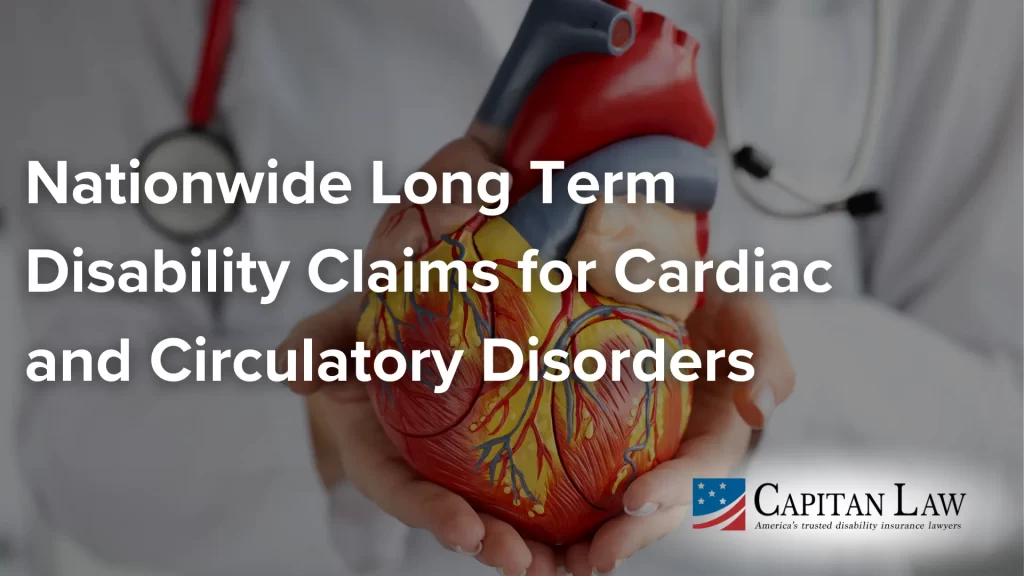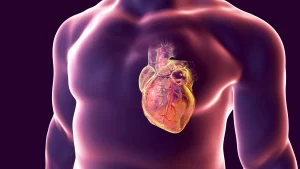 If you have suffered a heart attack or have been diagnosed with a cardiac or circulatory disorder that prevents you from working, you may qualify for long-term disability benefits.
If you have suffered a heart attack or have been diagnosed with a cardiac or circulatory disorder that prevents you from working, you may qualify for long-term disability benefits.
A wide range of cardiac and circulatory conditions could prevent you from being able to work to support yourself and your loved ones. If you’re dealing with a cardiac disorder, get help now – your health and livelihood depend on it. Consult an experienced long-term disability attorney at Capitan Law today. To schedule your free consultation, call (267) 419-7888 now.
Why Do I Need a Lawyer for a Long Term Disability Claim?
When you need help with a long term disability claim, you should hire an experienced lawyer, especially one who is skilled at handling individual or group disability benefits. Not every lawyer is qualified to handle long term disability claims. At Capitan Law, our attorneys focus exclusively on helping people like you get the benefits they deserve.
Because disability claims can be detailed and challenging to handle, not all law firms can able to successfully handle these cases. Much like you wouldn’t hire a dentist to perform brain surgery, you don’t want to hire just any personal injury lawyer to take on your disability case. If you are applying for disability benefits or appealing your claim, consult with the skilled and compassionate disability attorneys at Capitan Law, who only take disability insurance cases.
How Can Capitan Law Help Me?
At Capitan Law, we fight with dedication for clients who have had long-term disability claims denied by insurance companies.
When you select a lawyer for any legal matter, you want a firm with the right resources and experience to handle your case. Capitan Law has some of America’s most trusted disability insurance attorneys, who have been recognized by Rising Stars, which ranks the highest-performing attorneys in the country. With offices in Kentucky and Pennsylvania, Capitan Law can assist people in need of disability benefits to claim support throughout the United States.
Types of Cardiac and Circulatory Disorders
 The cardiovascular system consists of the heart, blood vessels, and the blood that the vessels transport. Common cardiac and circulatory disorders include:
The cardiovascular system consists of the heart, blood vessels, and the blood that the vessels transport. Common cardiac and circulatory disorders include:
Congestive heart failure – A condition where the heart cannot pump enough blood to meet your body’s needs. With congestive heart failure, the heart is not able to pump blood the way it should. This condition can affect one or both sides of the heart. Common causes of heart failure include coronary artery disease, high blood pressure (hypertension), and diabetes.
Heart attack – Also called a myocardial infarction, a heart attack occurs when the blood flow to your heart reduces severely or restricted entirely. Heart attacks result from the buildup of plaque in the arteries (atherosclerosis). They can be extremely serious and require prompt medical attention.
Coronary artery disease – CAD is the most common type of heart disease and the leading cause of death in the U.S. in both males and females. CAD occurs when the arteries that supply blood to the heart muscle become hardened and narrowed due to the buildup of cholesterol on their inner walls.
Ischemic Stroke – When the arteries to the brain become blocked off or narrow, it leads to reduced blood flow to the brain. The most common type of stroke, symptoms may include the following:
- Paralysis of the face
- Arms, or legs, severe headaches
- Trouble speaking and seeing
- Difficulty walking
Lymphedema – A collection of fluid that causes swelling in the arms and legs.
Recurrent arrhythmias – Involves an abnormal heart rhythm and accompanied by high blood pressure, artery disease, or another cardiac disorder.
Aortic aneurysm – An aortic aneurysm is when an abnormal bulge occurring in the wall of the aorta. The aorta is a major blood vessel that transports blood from your heart to your body. These occur anywhere in your aorta and may be tube-shaped or round.
Heart valve disorders – One or more of the four valves passing the blood through your heart may be too narrow, restricting blood flow to the rest of your body and leading to chronic heart failure. If you experience swelling in your ankles and feet along with heart pain, you may have a heart valve issue.
Chronic Venous Insufficiency – When the venous wall in the leg veins isn’t working correctly, it is difficult for blood to return to the heart. This condition causes blood to collect in the veins. This pooling of blood is known as stasis.
Peripheral Artery Disease (PAD) – A narrowing of the arteries in the extremities, leading to limited blood flow to surrounding tissues, pain, weakness, or numbness. PAD can potentially lead to a heart attack or stroke if left untreated.
Postural Orthostatic Tachycardia Syndrome (POTS) – POTS can make you feel lightheaded and dizzy, especially when you get up after lying down. If you have POTS, most of your blood stays in the lower part of your body when you stand up, making your heart beat faster to try to get blood to your brain.
Frequently Asked Questions (FAQs) about Cardiac and Circulatory and Disability Benefits
At Capitan Law, we are committed to aggressively advocating for those seeking disability benefits from insurance companies. Below are some common questions raised by our clients. We hope you find our answers help. Please call us at (267) 419-7888 if you have questions regarding your specific cardiac disorder case.
What are some signs and symptoms of a cardiac disorder?
Because heart attacks can strike suddenly and often kill their victims, recognizing the signs and symptoms of a cardiac disorder can save your life. Warning sides of a heart attack include:
- Chest pains
- Chest discomfort
- Shortness of breath
- Upper body pain
- Nausea
- Vomiting
- Cold sweats
- Dizziness
- Arm pain
- Back and neck pain
- Pain and discomfort in your stomach
Why was my disability claim denied?
Denied claims happen for any number of reasons. Many denials happen during the procedural process. For instance, insurance companies use different codes for different types of conditions. If the code for your cardiac condition does not match one that is automatically associated with a disability, your claim will most likely be denied. Other denials may be more complex. Hiring an experienced attorney who focuses on disability claims will put you in the best position for success in the claim appeals process.
How long will it take to resolve my case?
No two cases are alike. Every claim process is different depending on the condition, the benefits available, and the procedures for accessing those benefits. At Capitan Law, we fight tirelessly for the fastest resolution possible with each disability claim.
Call Capitan Law For a Free Consultation
If your long-term disability claim has been denied for a cardiac or circulatory disorder – or if you would like to open a new claim – seek the help of the skilled and compassionate attorneys at Capitan Law today. Our practice is devoted entirely to disability insurance law. We can assist you with every aspect of your long term disability claim so that you have a solid chance of success in receiving the benefits you need and deserve. Call (267) 419-7888 today to schedule your free consultation with Capitan Law. You will not have to pay us any fees unless the insurance company pays you the disability benefits that you are entitled to.